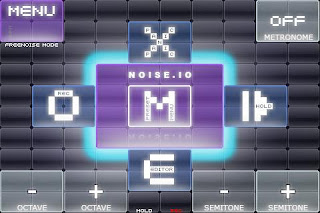
Here we are on day 4 of this mini-series on Noise IO Pro. Today I wanted to mention the Noise IO control surface. Of course how the control surface works depends greatly on how axes are mapped to parameters. You could argue in fact that the whole device is the control surface as you can map parameters to the acceleromoter as well.
The main control surface is simple to use and easy to get comfortable with. Adding control zones gives you more variables to play with, or using the surface in soundkey mode changes the way you 'play' the device altogether. In fact, in soundkey mode I think it is almost a two handed device and less useful for performance.

The virtual keyboard in Noise IO Pro is also very handy. It is velocity sensitive, but this is derived from the place on the key that is touched rather than the velocity at which you hit the device. In this mode the actual control surface is vastly reduced, but it is still there, and can be used quite well depending on how your parameters are set.

Overall the surface is very flexible and allows the user to define how they want to manipulate a given sound in a wide variety of ways. Noise IO Pro makes excellent use of the different axes and parameters available on the iPhone and iPod Touch, and I'm sure that these will expand over time.
Get Noise IO Pro at the App Store











